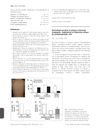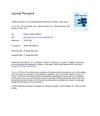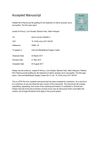 5 citations,
December 2018 in “Journal of Cosmetic Dermatology”
5 citations,
December 2018 in “Journal of Cosmetic Dermatology” PRP treatment improves hair count, density, and reduces hair loss in AGA patients.
 5 citations,
March 2018 in “Advances in integrative medicine”
5 citations,
March 2018 in “Advances in integrative medicine” A 23-year-old woman with Hashimoto’s thyroiditis improved significantly after a 15-month integrative treatment plan.
 5 citations,
June 2015 in “British Journal of Dermatology”
5 citations,
June 2015 in “British Journal of Dermatology” A certain medication improved severe itching in a boy with liver and bowel disease by reducing histamine levels, suggesting a new treatment target.
 5 citations,
February 2013 in “Klinik Psikofarmakoloji Bulteni-bulletin of Clinical Psychopharmacology”
5 citations,
February 2013 in “Klinik Psikofarmakoloji Bulteni-bulletin of Clinical Psychopharmacology” A teenager lost hair due to fluoxetine and sertraline, but it grew back after stopping these drugs and switching to a different one.
 5 citations,
December 2005 in “Clinical Techniques in Equine Practice”
5 citations,
December 2005 in “Clinical Techniques in Equine Practice” Skin and hair changes in horses can indicate serious diseases, and recognizing these signs is important for treatment and management.
 5 citations,
March 2005 in “Journal of The American Academy of Dermatology”
5 citations,
March 2005 in “Journal of The American Academy of Dermatology” 
Selenium can be toxic to animals, causing serious health issues, especially in horses.
 4 citations,
November 2020 in “BMC Dermatology”
4 citations,
November 2020 in “BMC Dermatology” Researchers identified genes in scalp hair follicles that may affect hair traits and hair loss.
 4 citations,
October 2020 in “JAAD Case Reports”
4 citations,
October 2020 in “JAAD Case Reports” Platelet-rich plasma may improve vitiligo treatment when used with phototherapy.
 4 citations,
August 2020 in “Facial plastic surgery & aesthetic medicine”
4 citations,
August 2020 in “Facial plastic surgery & aesthetic medicine” Combining growth factors with minoxidil improves hair growth more than minoxidil alone.
 4 citations,
June 2015 in “Journal of Genetics/Journal of genetics”
4 citations,
June 2015 in “Journal of Genetics/Journal of genetics” Genetic differences within ethnic groups may affect prostate cancer treatment effectiveness.
 4 citations,
July 2001 in “Journal of Cutaneous Medicine and Surgery”
4 citations,
July 2001 in “Journal of Cutaneous Medicine and Surgery” Tacrolimus is an effective treatment for several skin conditions with fewer side effects than cyclosporine.
 3 citations,
June 2023 in “Frontiers in medicine”
3 citations,
June 2023 in “Frontiers in medicine” Oxidative stress may contribute to hair loss in alopecia areata and antioxidants could potentially help as a treatment.
 3 citations,
May 2023 in “Frontiers in immunology”
3 citations,
May 2023 in “Frontiers in immunology” Faulty inflammasome activation may lead to autoimmune skin diseases and could be a target for new treatments.
 3 citations,
August 2022 in “Archives animal breeding/Archiv für Tierzucht”
3 citations,
August 2022 in “Archives animal breeding/Archiv für Tierzucht” Certain genetic changes in the KAP22-1 gene are linked to better wool quality in Egyptian sheep.
 3 citations,
February 2021 in “Medical journal, Armed Forces India”
3 citations,
February 2021 in “Medical journal, Armed Forces India” Combination therapy promotes better hair growth and density.
 3 citations,
March 2020 in “International Journal of Molecular Sciences”
3 citations,
March 2020 in “International Journal of Molecular Sciences” Thymosin β4 helps increase hair growth in Cashmere goats.
 3 citations,
December 2018 in “Meta Gene”
3 citations,
December 2018 in “Meta Gene” Certain gene variations increase male hair loss risk, influenced by hormone levels.
 3 citations,
January 2018 in “Postępy Dermatologii i Alergologii”
3 citations,
January 2018 in “Postępy Dermatologii i Alergologii” Longer TA repeats in the SRD5A2 gene may increase acne risk in Chinese people.
 3 citations,
August 2017 in “Oral and Maxillofacial Surgery Cases”
3 citations,
August 2017 in “Oral and Maxillofacial Surgery Cases” Using platelet-rich plasma and fat grafting to treat nerve pain showed promising results with no side effects.
 2 citations,
December 2023 in “Journal of clinical immunology”
2 citations,
December 2023 in “Journal of clinical immunology” Ruxolitinib significantly improves multiple autoimmune conditions in APS-1 patients.
 2 citations,
December 2019 in “Veterinary Dermatology”
2 citations,
December 2019 in “Veterinary Dermatology” Microneedling with platelet-rich plasma helps dog hair regrow faster than microneedling alone.
 2 citations,
July 2019 in “PLOS ONE”
2 citations,
July 2019 in “PLOS ONE” Certain genetic variations are linked to higher liver enzyme levels in patients treated for chronic hepatitis C with specific drugs.
 2 citations,
January 2018 in “International journal of research in dermatology”
2 citations,
January 2018 in “International journal of research in dermatology” Intralesional corticosteroids are the best for limited alopecia areata, oral steroids are less effective, and PRP is safe and promising, especially for children and severe cases.
 2 citations,
April 2017 in “Plastic and Aesthetic Nursing”
2 citations,
April 2017 in “Plastic and Aesthetic Nursing” Platelet-rich plasma therapy shows promise for hair regrowth in alopecia patients.
 2 citations,
January 2014 in “Elsevier eBooks”
2 citations,
January 2014 in “Elsevier eBooks” The document concludes that reactivation of herpesviruses, especially HHV-6, is linked to severe symptoms and complications in drug-induced hypersensitivity syndrome.

Adequate vitamin D might lower, and high hair chromium might increase DNA damage in obese women.
 1 citations,
February 2021 in “Animal feed science and technology”
1 citations,
February 2021 in “Animal feed science and technology” Organic selenium may offer better retention and less waste in puppies.
 1 citations,
January 2020 in “Aesthetic Surgery Journal”
1 citations,
January 2020 in “Aesthetic Surgery Journal” Platelet-rich plasma and stem cell therapies are accepted treatments for hair restoration, with specific protocols recommended for best results, but more standardization is needed in stem cell use.
 1 citations,
January 2020 in “Benha Journal of Applied Sciences”
1 citations,
January 2020 in “Benha Journal of Applied Sciences” Certain gene variations may increase the risk and severity of alopecia areata.






























